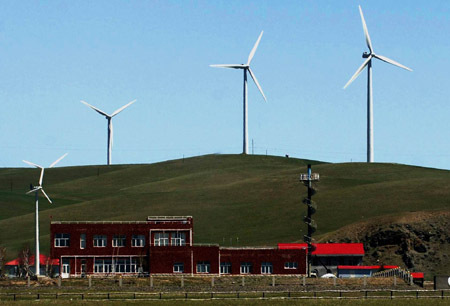V-7 Question: Recently, western media have been hyping that China poses a threat to world energy security, and blaming China for the global crude oil price hike. How viable is this claim? How will China meet its energy demand?
A: The claim that China threatens world energy security is unwarranted, just as a few other claims about China being a threat are. Several factors have contributed to the surge in crude oil prices, such as worldwide economic recovery and accelerated growth, wars, natural disasters, and speculations in the financial market. Blaming world crude oil price hike on increased imports by China is inappropriate. It is ironic that in 2006, China's crude oil imports were growing while the world crude oil price plunged, which discredited the claim that China has pushed up crude oil prices.
China is both a big energy consumer and producer. Most of the energy consumed in China is supplied by domestic production, while a small portion comes from imports. The average per-capita energy consumption and energy import of China is lower than the world average, and far below the average of developed countries. China imports oil and natural gas only to supplement its domestic output. In 2005, the net crude oil imports of China was 136 million tons, which was equivalent to 0.1 ton per capita, about one fourth of the world average per capita level; whereas the net crude oil imports of the United States was 613 million tons, 4.5 times that of China, and the per-capita imports for the United States was 2.09 tons, 20 times that of China. Japan, Germany and South Korea are almost 100 percent dependant on imported oil, and their aggregate annual oil imports are over 400 million tons.
Economic reform and opening up since 1978 has brought about robust economic growth and improved living standard, as well as increased demand for energy in China. The Chinese Government has been working hard to increase energy production and decrease energy consumption. Statistics show that from 1978 to 2005, China's primary energy consumption increased at an average annual rate of 5.16 percent while GDP grew at an average annual rate of 9.6 percent. Domestically produced energy accounted for over 90 percent of energy consumption in China. In comparison, 70 percent of energy consumption in OECD countries and 60 percent of that in the United States are from domestic output.
China's energy strategy is to put energy conservation in priority, and in the meanwhile, develop new energy sources and improve energy efficiency with technology and industry restructure. In the future, China is able to meet most of its energy demand with domestic production. China has potential to expand domestic supply. China is rich in coal; it will also explore for more oil and natural gas resources; and it has big potential in renewable energies. On the other hand, there is a big room for China to improve its energy efficiency. China's energy efficiency is low compared with developed countries. In order to build a resource efficient and eco-friendly society, China has set a goal to cut energy consumption per unit of GDP by 20 percent by the year 2010 from the 2005.

(China.org.cn)